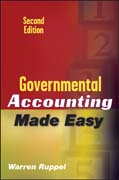
This is a hands-on guide to the ins and outs of governmental accounting - made easy! "Governmental Accounting Made Easy, Second Edition" equips you with the tools you need to run the financial and accounting operations within your organization. This complete and straightforward manual covers a broad range of governmental accounting topics that fall under the Governmental Accounting Standards Board, and its recently revised financial reporting model. Boiling downthe complicated details of governmental accounting into manageable essentials, author Warren Ruppel, a leading authority on governmental accounting, offerspractical information in easy-to-understand terminology. Even if you do not have a professional understanding of accounting principles and financial reporting, the Second Edition makes it all clear with accounting rules explained in terms anyone can understand, to help you better fulfill your managerial and fiduciary duties. Always practical and never over-technical, this helpful guide:discusses basic accounting terminology; clearly explains fund accounting; covers the nuts and bolts of governmental financial statements; equips you to understand the reporting entity; discusses revenues from non-exchange transactions; and, helps you become conversant in various accounting topics. The recentlyadopted reporting model for governments resulted in a radical change in the way governmental financial statements are presented. Suitable for professional managers, budget preparers, school boards, city councils, state legislators, and comptrollers, "Governmental Accounting Made Easy, Second Edition" is your essential guide for a clear, concise, understandable explanation of government finances. INDICE: Preface. Chapter 1 Introduction and Background. What Are Generally Accepted Accounting Principles? Who Sets Generally Accepted Accounting Principles for Governments? Do Governments Need to Comply with Generally Accepted Accounting Principles? Why Is Governmental Accounting and Financial Reporting Different from Commercial and Not-for-Profit Accounting and Financial Reporting? To What Entities Do Governmental Generally Accepted Accounting Principles Apply? Chapter 2 Basic Governmental Accounting Concepts. Understanding the Different Bases of Accounting. Understanding What Measurement Focuses Are Used by Governments. Defining and Understanding the Nature of Assets. Defining and Understanding the Nature of Liabilities. Defining and Understanding the Nature ofNet Assets. Chapter 3 Understanding Fund Accounting. Fund Fundamentals. Governmental Funds. Proprietary Funds. Fiduciary Funds. Chapter 4 Basics of Governmental Financial Statements. General-Purpose Financial Statements. Management'sDiscussion and Analysis. The Basic Financial Statements. Required Supplementary Information. Comprehensive Annual Financial Report. Chapter 5 Understandingthe Reporting Entity. Background. Accountability Focus. Financial Reporting Entity Defined. Display of Component Units. Chapter 6 Revenues from NonexchangeTransactions. Classes of Nonexchange Transactions. Accounting Requirements. Property Taxes. Income and Sales Taxes, and Other Derived Tax Revenues. Adjustments for the Accrual Basis of Accounting. Grants and Other Financial Assistance. Chapter 7 Capital Assets. Where Are Capital Assets Recorded in the Financial Statements? Recording and Valuing Capital Assets. Understanding Depreciation. Using the Modified Approach in Lieu of Depreciating Infrastructure Assets. The Basics of Capitalized Interest. Capital Assets Resulting from Capital LeaseTransactions. Intangible Assets. Impairments of Capital Assets. Chapter 8 Accounting for Pensions and Other Postemployment Benefits. Requirements for Defined Benefit Pension and OPEB Plans. Calculation of the ARC. Parameters for Actuarial Calculations, Including the ARC. Net Pension or OPEB Obligation. Recording Pension- and OPEB-Related Assets, Liabilities, and Expenditures/Expenses. Pension and OPEB Disclosures. Employers with Defined Contribution Plans. Chapter 9 Sundry Accounting Topics. Accounting for Investments. Reporting UnrealizedGains or Losses. Investment and Deposit Disclosures. Compensated Absence Accruals. Landfill Closure and Postclosure Care Costs. Derivatives, Including Interest Rate Swaps. Securities Lending Transactions. Chapter 10 Upcoming Developments in Governmental Accounting. Pension (and OPEB) Accounting-Revisited. Index.
- ISBN: 978-0-470-41150-6
- Editorial: John Wiley & Sons
- Encuadernacion: Cartoné
- Páginas: 304
- Fecha Publicación: 01/10/2009
- Nº Volúmenes: 1
- Idioma: Inglés
